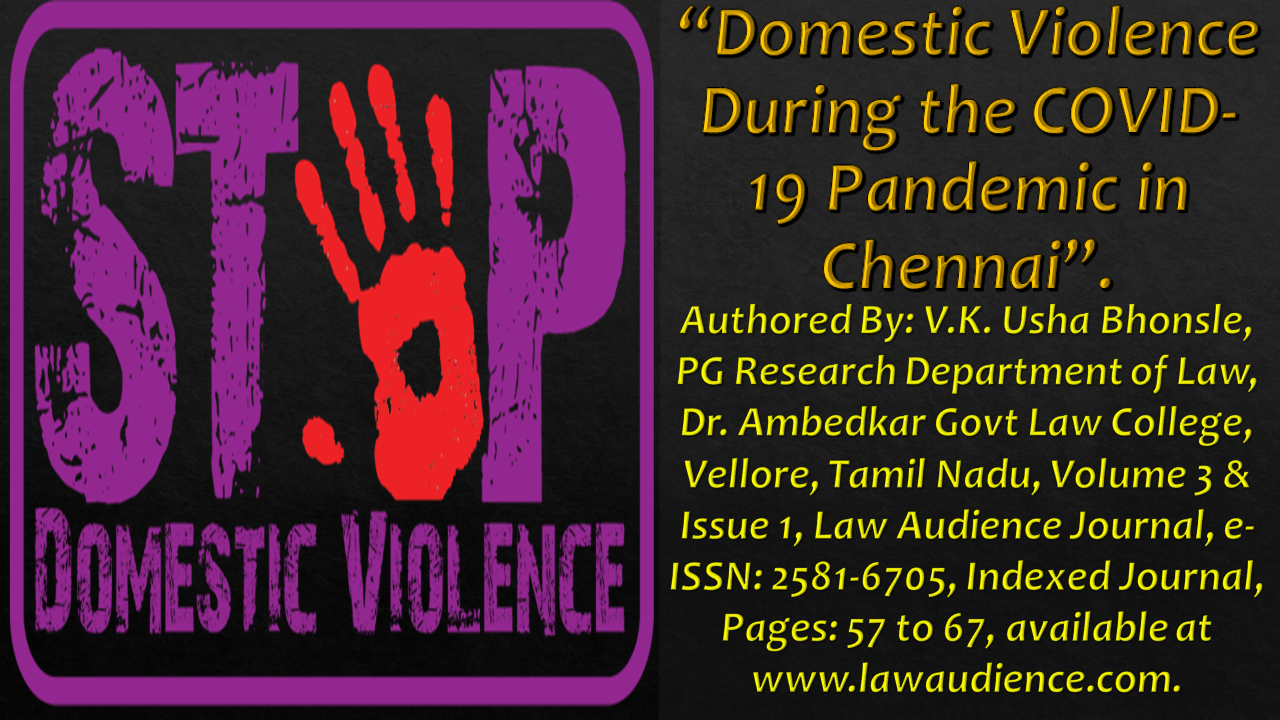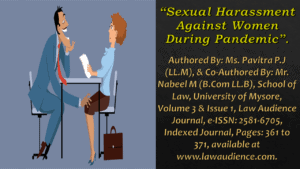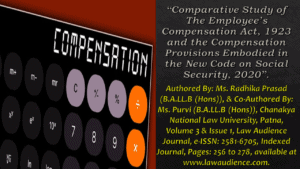Click here to download the full paper (PDF)
Authored By: V.K. Usha Bhonsle, PG Research Department of Law, Dr. Ambedkar Govt Law College, Vellore, Tamil Nadu,
Click here for Copyright Policy.
ABSTRACT:
“The COVID-19 pandemic has made many countries including India to impose mandatory lockdowns. Since the outbreak, the spotlight has been only on the economic impact of the pandemic. But it has given rise to other serious issues too. The already prevalent social evil called domestic violence has increased globally. In a country like India where the burden of gender inequality exists, domestic violence is considered to be an additive problem. Women and children are being abused and undergo severe violence each and every day inside their homes. During this pandemic crisis, victims of abuse can experience both acute and chronic harmful psychological effects.
Taking these effects into consideration, this article glances at the problem of domestic violence during COVID-19 crisis focusing the city of Chennai, the awareness of mental and health education, and the role of government in taking immediate steps to tackle this violence and provide relief to the victims”.
Keywords: Covid-19, lockdown, domestic violence, women, children, homes, safety, complaints, helplines, India, Chennai, prevention.
I. INTRODUCTION:
Coronavirus disease has affected every aspect of human life and has caused immense suffering. Although a home may seem to be the safest place for some, but does not imply for all. Domestic violence is considered to be the main reason for considering home to be a threatening place. Here comes the question of what domestic violence actually means. Domestic violence is an act of violence which involves a pattern of psychological, physical, sexual, financial and emotional abuse.
The National Commission for Women noted that the number of domestic violence cases has increased since the national lockdown started. In 2020, complaints of domestic harassment registered a rise of 79 per cent.[1] The lockdown is forcing people to be in close quarters with their abuser for long periods of time, which is one of the largest factors of this spike. Chennai city is not an exception to this problem. The city recorded high number of cases and has taken many initiatives to tackle this threat of domestic violence.
II. CHANGE IN THE CONCEPT OF HOME:
The implementation of Lockdown has changed the circumstances in Chennai upside down. Chennai is a busy metropolitan city which doesn’t shutdown at any time. Due to this mandatory lockdown, homes no longer remain as mere comfort zones but are being evolved as institutions which are reiterating patriarchy.
The people are working from homes, so homes are being turned into offices and workstations. The children are taking up online virtual classes and therefore houses have been turned into schools and colleges. Therefore, the homes no more remain to be the same as before. This has created a severe psychological pressure to everyone. As a result, it leads to several violences such as domestic violence which are especially faced by women and children.
III. REASON FOR DOMESTIC VIOLENCE DURING THE LOCKDOWN:
- During the lockdown period, even minor arguments went out of control;
- Couples were fighting over issues such as women doing all the household chores;
- Excessive use of mobile phones;
- Depression/ anger due to alcohol withdrawal;
- Financial troubles due to which stress and anger are taken out on the women;
- Extramarital affairs;
IV. PSYCHO-SOCIAL CONCERNS:
IV.I Lack of Awareness on the Availability of Hotlines:
Most of the time, victims of domestic violence do not report it to the authorities due to the ignorance of the public about the hotlines. This issue can be overcome by increasing the awareness and promotion of these services.
IV.II Misinformation and Role of Social Media:
Due to the rise of digital misinformation of COVID-19, it has become a burden to women. Fear of infection and transmission, as well as misinformation on social media, have affected women’s autonomy.
IV.III Fear of the Police/Legal Hassles:
Most of the time, women stay away from reporting to the police due to various reasons such as fear of being exploited by the police, lack of cooperation or even a fear of being attacked by the family. This reluctance to seek help increases the difficulty in reaching the police.
IV.IV Difficulty in Managing Family:
With family members living under the same roof, it can be very challenging for women to manage the various tasks that they have responsibilities for. Due to the traditional structures, women tend to have roles that are too heavy and may cause them to act in a way of aggression.
IV.V Objectification of Women:
The objectification theory states that men are valued more than women and that women are regarded as objects to be used by them. This belief system has negative effects on women’s physical and mental health.[2]
IV.VI Cycle of Violence:
As a mood enhancer, alcohol can increase a man’s anger and frustration. It could also shift his focus away from women to men. This could result in violence as the women become the target of his sexual desire.[3]
IV.VII Lack of Livelihood:
Women who are unable to work during this crisis have to critically balance their work and home lives. This can lead to discord within their families.
V. DIFFICULTY OF REPORTING COMPLAINTS DURING PANDEMIC:
One of the major disadvantages of Lockdown is that, the victims are not able to report or register complaints to the concerned authority. Few cases which depict the situation are as follows. In a slum, in Chennai, Parvathi, 25-year-old woman, on 25 March 2020 was severely beaten by her alcoholic husband. Earlier, when he used to beat her, she would run outside in the narrow lanes to call for help from neighbors. This strategy usually works every time, but this time Situation is different. Because of police barricade, she cannot go out to seek intervention of neighbors.[4]
In another incident in Chennai, a 45-year-old woman has been abused by her alcoholic husband for years, but the violence diminished a few months back when she got employment to serve as a maid and would return home with money. After the lockdown was imposed, her employer asked her to stay home and she was not paid. As her husband was deprived of his daily drink, he was in foul mood and started abusing her. She ran out of her house, courageously walked to the police barricade, and asked to be taken to the police station. The officer on duty asked her to go home saying that police and courts are shut because of lockdown.[5] Since the time the lockdown came into effect on 24th March 2020, Chennai, the state’s capital city had recorded only 45 complaints of domestic violence as on 22nd May 2020.[6] This data shows that many of the victims were unable to report the violence.
VI. ACTIONS TAKEN BY TAMILNADU POLICE:
When the Police receive a call or complaint, an official from the police station visits the concerned family and gives them required counselling and help. The husband is then asked to give it in writing that he will not repeat the same offence. Three to four days later, follow up action is taken by visiting the family or through phone calls, and if it is found that they are continuing to abuse their wives, a case is registered.
In serious cases, FIR has registered straight away and the accused is arrested, said the officer. Tamil Nadu Police also claimed that they have been undertaking a slew of measures to prevent an increase in the number of domestic violence cases during the lockdown period.
Some of the efforts are as follows:
- An ADSP rank police officer has been nominated as the nodal officer for each district to look into domestic abuse cases in the wake of the lockdown.
- The social welfare department has also been roped in to assist the police in their efforts.
- Women Anganwadi workers visit disturbed families and give them the required assistance.
- Regular visits are also being made to migrant worker camps and child care institutes.
- Social workers recruited by the NCW, also provides psycho-social-legal services to the distressed woman.
- Protection officers appointed under the Domestic Violence Act 2005 are allowed to move during the lockdown and some women in dangerous situations are being rescued and have been moved to shelter homes.
VII. ROLE OF STATE-OPERATED EMERGENCY HELPLINES[7]:
State-operated emergency helplines that women can dial in times of crisis have been set up at various levels over the years, providing emergency services, police intervention, medical and legal assistance. In addition to this, Chennai is home to various non-profit organizations that help women victims of gender-based violence and/or harassment.
There are also organizations in the city working on mental health, with a focus on women. The following is a non-exhaustive list of resources that women may use to seek support and help in times of need.
VII.I Dial 181[8]:
The women’s helpline number 181 was launched in December 2018, with the necessary infrastructure established at the cost of Rs 62 lakhs. The helpline is available 24 x 7 and can be used by women who face domestic violence or sexual harassment. The helpline will provide police assistance, legal aid and medical help including ambulance services. The helpline will also disseminate information on the government schemes that benefit women.
VII.II Dial 1091[9]:
The women’s helpline 1091 was launched in 2004 to help women report crimes. The lines are manned by trained police personnel. The helpline was launched as a mode of easing access to police and removing any stigma or fear that women may have of approaching the police. The calls will be dealt with in the same manner and urgency as calls placed on the general police helpline, 100.
VII.III Distress Hotline[10]:
A dedicated helpline for women in distress was introduced by the Chennai Police in December 2019. The helpline number is 8300304207 and is functional at all hours. This number will operate in addition to the other helplines that are available at present.
VII.IV Dial 112[11]:
A single emergency helpline for all emergency services was launched across 16 states including Tamil Nadu by the Union Government. This includes access to the services of the women’s helpline. The helpline will provide emergency assistance and appropriate legal, medical or police help. This number was launched to function similar to the integrated national helplines found in UK and USA.
In addition to the above state helplines, the following not-for-profit organizations also provide help to women in vulnerable situations:
VII.V The International Foundation for Crime Prevention and Victim Care (PCVC)[12]:
PCVC was founded in Chennai in 2001 and works to create a “support network for women and queer individuals facing domestic and interpersonal violence”. The organization provides both emergency and rehabilitation.
Crisis intervention help offered includes dealing with the police, creating an exit plan from abusive relationships and households, as well as medical and legal help and counselling. The organization also helps with skill-building and employment opportunities for women.
VII.VI The Banyan[13]:
The Banyan is one of the most well-known NGOs in the city, providing mental health services for the homeless. Many women who have been abandoned by their families due to poor mental health have benefitted from interventions by The Banyan. The NGO runs a hospital and shelter service which helps women, providing necessary mental health care to set them on the path to recovery.
Efforts are made to reunite them with family, failing which women are accommodated in group homes and living options available at the Banyan. They also provide training in vocational skills that will enable the women under their care to be able to earn.
VII.VII Nakshatra NGO[14]:
Nakshatra is a non-profit organisation established in 2012 that works in areas of sexual violence and trafficking. The organisation provides legal, medical and counselling assistance. The NGO also works in prevention of sexual violence with education and awareness sessions across the city.
The organization set up a dedicated rape crisis center to help survivors of sexual violence. The crisis center is operational 24*7, with assistance for survivors in filing complaints and medical examination.
VII.VIII Aware NGO[15]:
Aware NGO works on areas of gender-based violence through sensitization and provides help for women affected by violence. The organization conducts safety audits of various spots in the city and has made efforts to push authorities to increase safety for women in public transport. Holistic community development, with women’s safety as a key driver, is a project undertaken by the NGO in Semmenchery.
VIII. ROLE OF MENTAL HEALTH EDUCATION (MHE)[16]:
Mental Health Education is a type of intervention that can be used at times of crisis. It is designed to promote mental health and social wellbeing among individuals and communities. MHE is a tool that can help raise awareness about domestic abuse. It can also help in the larger reach of the issue by carrying out various activities such as training and advocacy programs.
The ways are as follows:
VIII.I Increasing awareness[17]:
Information Education Communication (IEC) materials can be used to inform the public about the various services available for victims of intimate partner violence. They can also be used to create awareness among the masses.
VIII.II Provision of Legal Aid work:
This system could be used to generate reports on various aspects of women’s lives, such as physical health, education, and employment. It could be utilized by the police, women cells, and legal aid cells to keep track of women’s cases.
VIII.III Media-Physician collaboration[18]:
Mental health and public health experts need to collaborate actively with all forms of print and digital media to debunk misinformation and help to educate the community about abuse prevention.
VIII.IV Victim Care[19]:
MHE measures can be critical in helping the victims avail counselling and treatment facilities fight the stigma and preserving their autonomy and self-esteem.
IX. CONCLUSION:
Due to the increasing number of cases suffering from domestic violence, it is necessary that these services are provided through various means such as telephone, online or other virtual platforms. This will help minimize the suffering of the needy victims.
Non-Governmental-Organizations and civil society members also have a vital role in the prevention of this social evil.
The COVID-19 pandemic might be an opportunity for us to relook at our efforts in addressing domestic violence prevention and care.
Footnotes:
[1] Shemin Joy, Domestic Violence Complaints Rose 79% in 2020, available at https://www.deccanherald.com/national/domestic-violence-complaints-rose-79-in-2020-934903.html.
[2] Dawn M. Szymanski & Lauren B. Moffitt & Erika R. Carr, Sexual Objectification of Women: Advances to Theory and Research, available at https://www.apa.org/education/ce/sexual-objectification.pdf.
[3] Marlene J. Berg,corresponding, David Kremelberg, Purva Dwivedi, Supriya Verma, Jean J. Schensul, Kamla Gupta, Devyani Chandran, and S. K. Singh, The Effects of Husband’s Alcohol Consumption on Married Women in Three Low-Income Areas of Greater Mumbai, available at https://www.ncbi.nlm.nih.gov/pmc/articles/PMC2956186/.
[4] Adv Dr Shalu Nigam, COVID-19 Lockdown and Violence Against Women in Home, available at https://countercurrents.org/2020/04/covid-19-lockdown-and-violence-against-women-in-home/.
[5] Ibid.
[6] Vignesh Radhakrishnan, Sumant Sen and Naresh Singaravelu, Data|Domestic Violence Complaints at A 10-Year High During COVID-19 Lockdown, available at https://www.thehindu.com/data/data-domestic-violence-complaints-at-a-10-year-high-during-covid-19-lockdown/article31885001.ece.
[7] Aruna Natarajan, Chennai Helplines for Women Suffering Abuse, Gender Violence or Mental Health Issues, available at https://chennai.citizenmatters.in/womens-helplines-in-chennai-for-sexual-abuse-violence-and-mental-health-issues-13478.
[8] Ibid.
[9] Ibid.
[10] Ibid.
[11] Ibid.
[12] Ibid.
[13] Ibid.
[14] Ibid.
[15] Ibid.
[16] Gautam Gulatia, and Brendan D. Kelly, Domestic Violence Against Women And The COVID-19 Pandemic: What is the Role of Psychiatry?, available at https://www.ncbi.nlm.nih.gov/pmc/articles/PMC7264022/.
[17] Ibid.
[18] Ibid.
[19] Ibid.
References:
- SHEMIN JOY, Domestic Violence Complaints Rose 79% in 2020, available at https://www.deccanherald.com/national/domestic-violence-complaints-rose-79-in-2020-934903.html.
- DAWN M. SZYMANSKI & LAUREN B. MOFFITT & ERIKA R. CARR, Sexual Objectification of Women: Advances to Theory and Research, available at https://www.apa.org/education/ce/sexual-objectification.pdf.
- MARLENE J. BERG, CORRESPONDING, DAVID KREMELBERG, PURVA DWIVEDI, SUPRIYA VERMA, JEAN J. SCHENSUL, KAMLA GUPTA, DEVYANI CHANDRAN, AND S. K. SINGH, The Effects of Husband’s Alcohol Consumption on Married Women in Three Low-Income Areas of Greater Mumbai, available at https://www.ncbi.nlm.nih.gov/pmc/articles/PMC2956186/.
- ADV DR SHALU NIGAM, COVID-19 Lockdown and Violence Against Women in Home, available at https://countercurrents.org/2020/04/covid-19-lockdown-and-violence-against-women-in-home/.
- VIGNESH RADHAKRISHNAN, SUMANT SEN AND NARESH SINGARAVELU, Data|Domestic Violence Complaints at A 10-Year High During COVID-19 Lockdown, available at https://www.thehindu.com/data/data-domestic-violence-complaints-at-a-10-year-high-during-covid-19-lockdown/article31885001.ece.
- ARUNA NATARAJAN, Chennai Helplines for Women Suffering Abuse, Gender Violence or Mental Health Issues, available at https://chennai.citizenmatters.in/womens-helplines-in-chennai-for-sexual-abuse-violence-and-mental-health-issues-13478.
- GAUTAM GULATIA, AND BRENDAN D. KELLY, Domestic Violence Against Women and The COVID-19 Pandemic: What is the Role of Psychiatry?, available at https://www.ncbi.nlm.nih.gov/pmc/articles/PMC7264022/.
Cite this article as:
V.K. Usha Bhonsle, PG Research Department of Law, Dr. Ambedkar Govt Law College, Vellore, Tamil Nadu, Domestic Violence During the COVID-19 Pandemic in Chennai, Vol.3 & Issue 1, Law Audience Journal, Pages 57 to 67 (27th May 2021), available at https://www.lawaudience.com/domestic-violence-during-the-covid-19-pandemic-in-chennai/.



